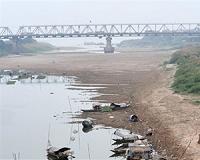| . |  |
. |
Beijing (UPI) Sep 30, 2010 China's $62 billion South-North Water Transfer Project is forcing the relocation of 330,000 people and may not even deliver clean water. The system, designed to supply 45 trillion gallons of water for hundreds of millions of people in Beijing and drought-prone northern China by 2030, involves a mix of canals, tunnels and aqueducts spanning thousands of miles across the country. Sans pumps, it will rely entirely on gravity to run water from the south's higher elevations, to the north. In the province of Henan, for example, a canal 1,000 feet wide and 180 feet deep has been dug that will pass beneath the Yellow River. In Hubei province, engineers have raised the height of the Danjiangkou Dam, forcing the eventual relocation of 330,000 people. Last month, 1,600 people were moved to a government-designed village in Guanggou surrounded by a tall iron fence, where they are being trained how to farm the land that is drier than their old fields. Wang Shushan, who is in charge of the South-North diversion project in Henan province, where most of the construction is now focused, compared the massive endeavor to China's Great Wall, saying it is "essential for the survival of China," the Los Angeles Times reports. "It is a must-do project. We can't afford to wait." China's current total water shortage is around 1.5 trillion gallons, equal to three times the annual water supply of New York City, says China's NDTV. Annual water demand in Beijing is expected to swell to 1.1 trillion gallons by 2020, city government estimates indicate. But Liu Changming, a government adviser on the project from the Chinese Academy of Sciences acknowledges that the diversion project does carry risks. "This project carries water from south to north, while China's rivers flow from west to east," he told National Public Radio. "The intersections are very risky. In extreme weather, mudflow or debris flow or flash floods could occur. We must take preventive actions." The Chinese government has also acknowledged that the water from an eastern spur of the project is so toxic that it may not even be fit for agriculture, the Times said. "They are robbing the water of the rest of China to supply Beijing -- and it probably won't work anyway," said Dai Qing, a pro-democracy activist who focuses on water issues. Dai pointed out that there wasn't enough clean water in the south to supply the north and that whatever reaches Beijing might be too polluted.
earlier related report "We are determined to develop Canada's oil sands in a manner that it sustainable and environmentally sensitive," Environment Minister Jim Prentice said. "This independent review by some of Canada's most respected scientists is a critical step in ensuring that environmental issues are balanced with economic considerations." The panel will be chaired by former United Nations Environment Programme executive director Elizabeth Dowdeswell, and is to report back to the environment minister within 60 days. The announcement comes after Prentice met this week with filmmaker James Cameron, who added his voice to a deepening chorus of criticism of the environmental impacts of developing the world's second-largest oil reserve. The oil sands "will be a curse if it's not managed properly. It can also be a great gift to Canada and to Alberta if it is managed properly," the director of blockbuster films "Avatar," "Titanic" and "The Terminator" said Wednesday. "It is impossible to imagine a refining process that did not have negative environmental impacts. It would have to be some kind of Immaculate Conception," Cameron said. But it can be "mitigated," he said after meeting with oil sector executives and politicians, flying over the tar sands in a helicopter, driving to a tailing pond at a Syncrude site, and visiting a native community downstream. Aboriginals living along the Athabasca River, near the oil sands, "are afraid to drink the water and eat the fish and let the kids swim in the river," Cameron noted. "If they say the (local) fish tastes different and they're being affected... I think it would behoove us to listen to that and find out what the causal links are," he said in calling for improved environmental monitoring. Prentice acknowledged the criticisms of "the nature of that testing, whether it's being done in the right places at the right time with the right equipment and whether it's producing the kind of data that we need to have to make the right public policy choices." "We have to be prepared to continually improve our regulatory system and we have to make sure that we're getting state-of-the-art information with a state-of-the-art testing system," he said.
Share This Article With Planet Earth
Related Links Water News - Science, Technology and Politics
 'River crisis' worsens threat of water scarcity - study
'River crisis' worsens threat of water scarcity - studyParis (AFP) Sept 29, 2010 The vast majority of the world's rivers are reeling from pollution, over-development and excessive extraction, and billions of dollars of investment by rich countries to avert water stress have damaged biodiversity, a study released on Wednesday said. "Rivers around the world really are in a crisis state," said one of its authors, Peter McIntyre, a professor of Zoology at the University of W ... read more |
|
| The content herein, unless otherwise known to be public domain, are Copyright 1995-2010 - SpaceDaily. AFP and UPI Wire Stories are copyright Agence France-Presse and United Press International. ESA Portal Reports are copyright European Space Agency. All NASA sourced material is public domain. Additional copyrights may apply in whole or part to other bona fide parties. Advertising does not imply endorsement,agreement or approval of any opinions, statements or information provided by SpaceDaily on any Web page published or hosted by SpaceDaily. Privacy Statement |